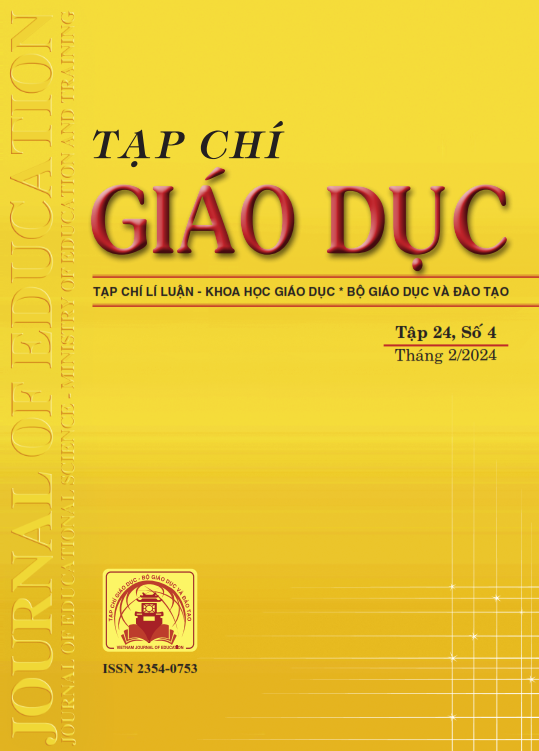Hợp tác nhà trường - doanh nghiệp trong nghiên cứu khoa học và đào tạo sinh viên ngành Dược học: nghiên cứu trường hợp tại Trường Đại học Thành Đô
Tóm tắt
In recent years, higher education institutions have become increasingly interested in business participation in the training process. This is also considered one of the important criteria to evaluate the quality of training programs of higher education institutions (Ministry of Education and Training, 2016). More specifically, when businesses cooperate with higher education institutions, the training program will be designed according to the actual requirements of the business. Hence, businesses can also recruit professionally satisfactory graduates from the university. Therefore, cooperation between schools and businesses is essential and inevitable for parties. This article presents some theoretical bases and practical experiences of implementing a cooperation project between universities and enterprises in scientific research and training for students majoring in Pharmacy, Thanh Do University. This model has been successfully applied in the research and development of a number of products, while promoting the commercialization process and direct application of research results into teaching Pharmacy students at the School.
Tài liệu tham khảo
Abreu, M., Grinevich, V., Hughes, A., Kitson, M., & Ternouth, P. (2008). Universities, business and knowledge exchange. Higher Education and Centre for Business Research: London and Cambridge.
Badgett, K. (2016). School-Business Partnerships: Understanding Business Perspectives. School Community Journal, 26(2), 83-105.
Barber, N. A., Wilson, F., Venkatachalam, V., M. Cleaves, S., & Garnham, J. (2014). Integrating sustainability into business curricula: University of New Hampshire case study. International Journal of Sustainability in Higher Education, 15(4), 473-493. https://doi.org/10.1108/IJSHE-06-2013-0068
Bộ GD-ĐT (2016). Thông tư số 04/2016/TT-BGDĐT ngày 14/3/2016 ban hành quy định về Tiêu chuẩn đánh giá chất lượng chương trình đào tạo các trình độ của giáo dục đại học.
Carayol, N. (2003). Objectives, agreements and matching in science-industry collaborations: reassembling the pieces of the puzzle. Research Policy, 32(6), 887-908. https://doi.org/10.1016/S0048-7333(02)00108-7
Đảng Cộng sản Việt Nam (2021). Văn kiện Đại hội đại biểu toàn quốc lần thứ XIII (tập 1). NXB Chính trị Quốc gia - Sự thật.
Đỗ Thị Thanh Toàn (2018). Liên kết trường đại học và doanh nghiệp - Phương thức nâng cao chất lượng đào tạo. Tạp chí Giáo dục, 432, 34-38.
Enterprise, L. S. E. (2013). Feasibility study on student lending. EAC/47/2009, Final report.
Gibb, A., & Hannon, P. (2006). Towards the entrepreneurial university. International Journal of Entrepreneurship Education, 4(1), 73-110.
Jang, H. Y., & Yeon, K. S. (2020). A Study on Designing an Education Cooperation Model for HRD in Asia-Pacific Region: Focusing on Education Project of APEC. Educational Technology International, 21(1), 31-67. https://doi.org/10.23095/ETI.2020.21.1.031
Kruss, G. (2004). Employment and employability: Expectations of higher education responsiveness in South Africa. Journal of Education Policy, 19(6), 673-689. https://doi.org/10.1080/0268093042000300454
Maralani, F. M. (2016). The Mediation Role of Intrinsic and Extrinsic Motivation in the Relationship between Creative Educational Environment and Metacognitive Self-Regulation. Journal of Education and Learning, 5(3), 272-277. http://dx.doi.org/10.5539/jel.v5n3p272
Nguyen Van Hiep (2021). High Quality Human Resources Development. Journal of the University of Shanghai for Science and Technology, 23(1), 119-130.
Nguyễn Thị Thu Trang (2021). Students’ evaluation of the outcomes achieved from their learning experience at industrial university of Ho Chi Minh city. Journal of Science and Technology, 53(5), 141-153. https://doi.org/10.46242/jstiuh.v53i05.4146
Othman, R., & Omar, A. F. (2012). University and industry collaboration: towards a successful and sustainable partnership. Procedia-Social and Behavioral Sciences, 31, 575-579.
Phạm Thị Thu Phương (2016). Các phương thức hợp tác giữa cơ sở đào tạo với doanh nghiệp trong đào tạo sinh viên ngành Du lịch đáp ứng nhu cầu hội nhập. Tạp chí Phát triển khoa học và công nghệ, 19, 120-126.
Pham, Q. V. (2017). Level of employment satisfaction of Humanities and social sciences graduates. VNU Journal of Social Sciences and Humanities, 3(3), 342-350. https://doi.org/10.1016/j.sbspro.2011.12.106
Pharr, S. W. (2001). Cooperative research efforts between business schools and the private and public sectors: Frequency of occurrence and outcomes. Journal of Applied Business Research (JABR), 17(2). https://doi.org/10.19030/jabr.v17i2.2069
Quốc hội (2018). Luật Sửa đổi, bổ sung một số điều của Luật Giáo dục đại học. Luật số 34/2018/QH14, ban hành ngày 19/11/2018.
Suzdalova, M. A., Lizunkov, V. G., Malushko, E., Sytina, N., & Medvedev, V. (2017). Innovative Forms of Partnership in Development and Implementation of University-Business Cooperation. The European Proceedings of Social & Behavioural Sciences (EpSBS). Vol. 19: Lifelong Wellbeing in the World (WELLSO 2016), pp. 450-455.
Wong, Y. K. (2021). Human resources development using AI. International Journal of Engineering Trends and Applications (IJETA), 8(4), 56-60.
Tải xuống
Đã Xuất bản
Cách trích dẫn
Số
Chuyên mục
Giấy phép

Tác phẩm này được cấp phép theo Ghi nhận tác giả của Creative Commons Giấy phép quốc tế 4.0 .












